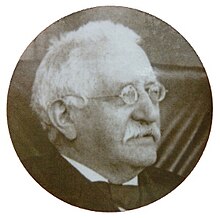Hermann Fölsch

This first of a total of eight saltpeter works was established in 1872, sold in 1916 and closed in 1931. The ruins of the factory ( 20 ° 22 ′ S , 69 ° 52 ′ W ) in which Fölsch once won the white gold and thus built up his fortune are now unnoticed in the desert.
Hermann Conrad Johannes Fölsch (born November 19, 1845 in Hamburg ; † December 1, 1920 in Moholz bei Niesky ) was a German businessman , entrepreneur and shipowner .
Life
Hermann CJ Fölsch traveled to South America in 1866 and together with the German-Chilean Frederico Martin founded a company for the extraction of saltpeter in Iquique in the Atacama Desert in northern Chile in 1872 . Fölsch's childhood friend and later brother-in-law, Henry B. Sloman , followed him and worked for twenty years as his managing director before he went into business for himself and built his own saltpeter empire in Chile. Business was unusually successful. Chile's nitrate was the most important raw material for the production of aniline dyes , explosives and fertilizers, and so Germany's emerging agricultural industry became the most important buyer of Chile's nitrate in Europe. As a result, the Port of Hamburg in particular prospered : within 40 years, the import of saltpetre increased almost 40 times to 509,800 tons in 1905, of which the companies of Hermann CJ Fölsch and Henry Sloman played a very large part.
In order to keep the Chiles nitrate trade in his own hands, Fölsch founded his own shipping company in 1881. In 1914 the company had four sailors with a good 9,000 net register tons. Due to the dangerous route around Cape Horn , it was a high-risk business, but it promised enormous income: the four-masted steel barque Passat of the Hamburg shipping company Ferdinand Laeisz was able to transport over 4,000 tons of Chile nitrate, which corresponded to a freight value of over a million marks (today approx. ten million euros). Hermann Fölsch invested his profits primarily in real estate. Little by little he bought several properties and houses on Hamburg's Rathausmarkt. After the Second World War, this resulted in the “ Fölsch Block ”, directly opposite Hamburg City Hall , which is still owned by the family today.
Hermann Fölsch joined the Moravian Brethren . As a friend of Johannes Wichern , he was committed to young people at risk, donated large sums and in 1906 donated houses in Hamburg on Fehlandtstrasse and in the Esplanade to set up a Christian waiter's home. This later became the Hotel Baseler Hof .
Web links
- Biography Hermann Fölsch. Retrieved August 28, 2020 .
Individual evidence
- ↑ Robert Krieg, Monika Nolte: Oro blanco. La historia . (Spanish, krieg-nolte.de [accessed on May 19, 2013]).
- ↑ Juan Ricardo Couyoumdjian: Chile y Gran Bretaña durante la Primera Guerra Mundial y la postguerra 1914-1921 . Editoria Andrés Bello, Santiago de Chile 1986, LCCN lc86-222403 , p. 340 ( online [accessed May 19, 2013]).
- ↑ Miguel González P .: Dr. Oscar Contreras Tapia . Maestros de la cirugía chilena. In: Revista Chilena de Cirugía . tape 47 , no. 1 , February 1995, ISSN 0379-3893 , p. 8–12 (Spanish, excerpt [accessed May 19, 2013]).
- ↑ Rudolf Martin (Ed.): Yearbook of the wealth and income of millionaires in the three Hanseatic cities (Hamburg, Bremen, Lübeck). Berlin 1912, p. 1.
- ↑ Jürgen Meyer: Hamburg's sailing ships 1795-1945. Chronicle of the seafaring, Verlag Egon Heinemann Norderstedt
- ^ Hans Georg Prager: F. Laeisz. From cargo sailors to bulk carriers. Koehlers Verlagsgesellschaft mbH, Herford 1974, ISBN 3-7822-0096-9 .
- ↑ Peter Klingbeil: The Flying P-Liner. The sailing ships of the shipping company F. Laeisz. Verlag Die Hanse, Hamburg 1998 and 2000, ISBN 3-434-52562-9 .
- ^ History of the Fölsch block
- ^ Dietrich Meyer: Zinzendorf and the Moravian Brethren. 1700-2000. Vandenhoeck & Ruprecht, Göttingen 2009, ISBN 978-3-525-01390-8 .
- ↑ Gisela Mettele: Cosmopolitanism or God's Kingdom. The Moravian Brethren as a global community 1727–1857. (= Bourgeoisie , New Series, Volume 4.) Vandenhoeck & Ruprecht, Göttingen 2009, ISBN 978-3-525-36844-2 . (also habilitation thesis, Chemnitz University of Technology, 2004)
- ^ Stephan Sturm: Welfare State and Christian Social Thought. Johann Hinrich Wichern's social theology and its recent reception from a systems theoretical perspective. Kohlhammer, Stuttgart 2007, ISBN 978-3-17-016879-4 .
- ^ History of the Basel court
| personal data | |
|---|---|
| SURNAME | Fölsch, Hermann |
| ALTERNATIVE NAMES | Fölsch, Hermann Conrad Johannes (full name) |
| BRIEF DESCRIPTION | German businessman, entrepreneur and shipowner |
| DATE OF BIRTH | November 19, 1845 |
| PLACE OF BIRTH | Hamburg |
| DATE OF DEATH | December 1, 1920 |
| Place of death | Moholz at Niesky |
